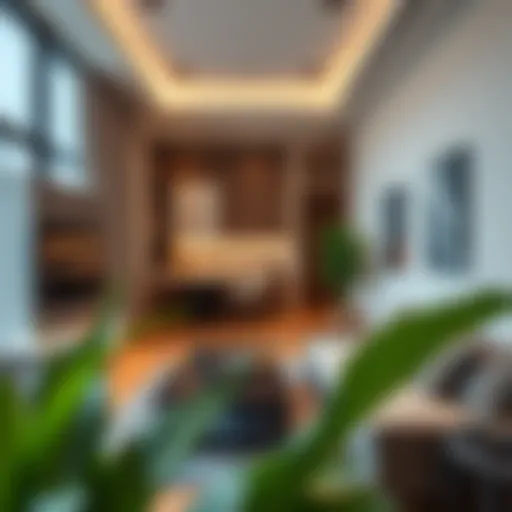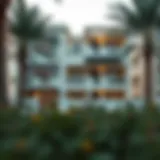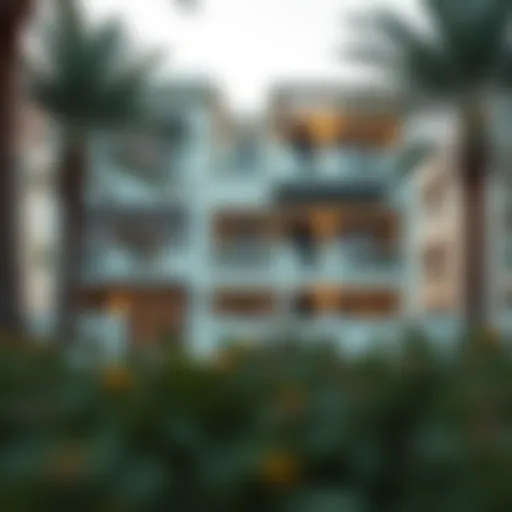Discovering Dubai's Stunning Gardens: A Detailed Guide
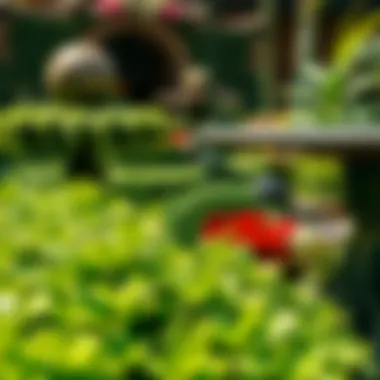
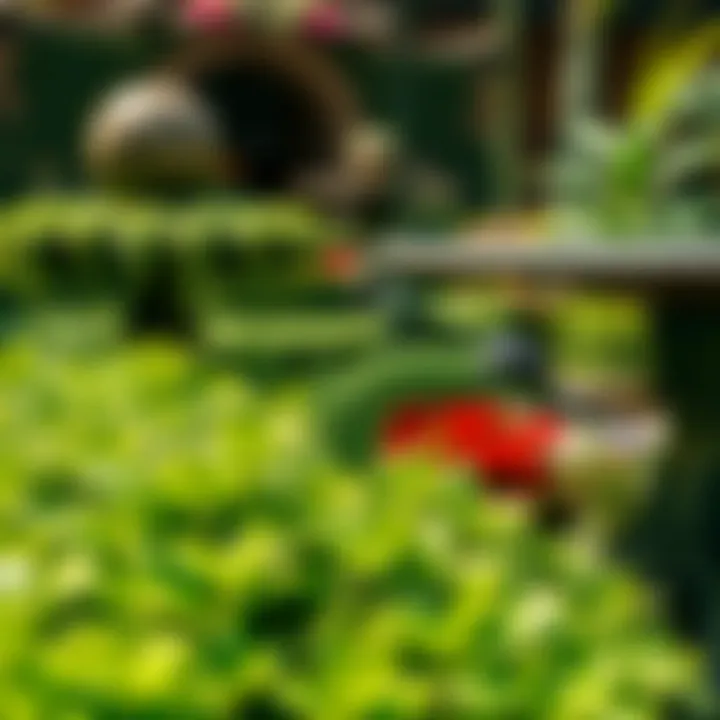
Intro
Dubai, known for its grandeur and innovation, often dazzles visitors with towering skyscrapers and opulent malls. However, the soul of the city lies hidden among its serene gardens, each telling its own story through meticulous design and lush greenery. This article explores the fascinating realms of Dubai’s gardens, shedding light on their significance, unique features, and the evolving trends in landscaping. Whether you're a resident aiming to find an oasis in the desert or a visitor seeking a quiet escape from the bustling city, the gardens of Dubai are treasures worth discovering.
The gardens not only enhance the aesthetic appeal of the urban landscape but also play a crucial role in improving the quality of life for both residents and tourists. With climate challenges hitting hard in the region, understanding these green spaces becomes paramount as they offer insight into sustainable practices that can be emulated in other arid regions around the globe. From community parks bursting with life to exclusive private retreats, there is a wealth of greenery waiting to be explored.
What's more, for those eyeing investment opportunities, the growth of green spaces significantly influences property values and urban development. As the city plans to expand its green footprint, delving into the market trends and investment opportunities related to these gardens can offer invaluable knowledge for investors, agents, and buyers alike.
Foreword to Dubai's Green Spaces
Dubai, a city known for its towering skyscrapers and sizzling deserts, harbors a surprisingly lush and diverse array of gardens and green spaces. These verdant patches are not mere embellishments; they represent a vital segment of urban life, contributing to the health and well-being of residents and tourists alike. As the city continues to develop and modernize, the importance of green spaces remains paramount in shaping Dubai's identity.
Overview of Gardening Culture in Dubai
The gardening culture in Dubai reflects the broader influences of its history, geography, and societal values. Traditionally, the harsh desert climate posed challenges, creating limited opportunities for greenery. Yet, with advancements in technology and irrigation, gardening has thrived, indicating a clear shift in cultural appreciation towards nature.
Today, community gardens, landscaped parks, and private oases have blossomed amidst the urban sprawl. Residents actively engage in gardening, finding solace in nurturing plants despite the heat. From growing herbs and vegetables in balconies to lush, tropical gardens in villas, the desire to create personal retreats speaks volumes about the evolving mindset toward the natural environment.
Significance of Gardens in Urban Dubai
Gardens serve a multi-faceted role within the urban context of Dubai:
- Economic Growth: Green spaces can elevate property values, increasing appeal for investors and potential homeowners.
- Environmental Benefits: Gardens contribute to biodiversity, combating pollution and promoting ecosystem health.
- Social Cohesion: Parks and community gardens invite neighbors to interact and build relationships, thereby strengthening the social fabric of the city.
- Mental Well-being: Urban gardens offer an escape from the hustle and bustle. Natural surroundings are known to reduce stress and enhance mental health.
"In a city where concrete dominates, gardens provide a breath of fresh air, both literally and metaphorically."
Through these aspects, gardens in Dubai are not only ornamental but integral to the city's overall sustainability and livability. As the city continues to grow, the commitment to fostering green spaces will shape a brighter, more balanced future.
Public Gardens: Community and Nature
Public gardens in Dubai offer not only a patch of green in a predominantly urban setting but act as essential junctures for community interaction and ecological awareness. These natural spaces help in fostering a sense of belonging among residents, providing places to unwind, socialize, and connect with nature. For investors, agents, and buyers, understanding the significance of these public spaces plays a crucial role in recognizing real estate potential, as proximity to well-maintained gardens can increase property value and appeal.
Zabeel Park
Zabeel Park is a noteworthy highlight among Dubai's green spots. Stretching over 47 hectares, this park is famed for its unique blend of landscaping and entertainment. Designed with a careful eye for aesthetics, Zabeel Park incorporates various amenities such as scenic pathways, stretches of lush lawns, and recreational facilities. Its centerpieces include a stunning lake and the iconic Dubai Frame, symbolizing the city’s blend of the past and the future.
The park serves as a community hub, hosting events, festivals, and a range of activities that draw families and tourists alike. By providing a safe environment for children to play and adults to engage in leisurely activities, Zabeel Park underscores the importance of public gardens in enhancing social cohesion.
"Public parks are like the lungs of a city; they breathe life into the concrete jungle."
Dubai Miracle Garden
Among the myriad attractions in Dubai, the Dubai Miracle Garden stands out like a diamond in the rough. Boasting over 150 million flowers, this garden showcases nature's diversity in an astonishing display of color and design. Opening every year from November to April, it transforms a barren plot into a blossoming paradise, capturing the imagination of countless visitors.
The garden is not only a visual treat but also serves as a hub for environmental education. With sustainable practices woven into its framework, it promotes responsible gardening and appreciation for nature among its visitors. For potential investors, the garden plays a dual role, enhancing local allure while providing opportunities for businesses that cater to tourism and events, enriching the local real estate landscape.
Al Barsha Pond Park
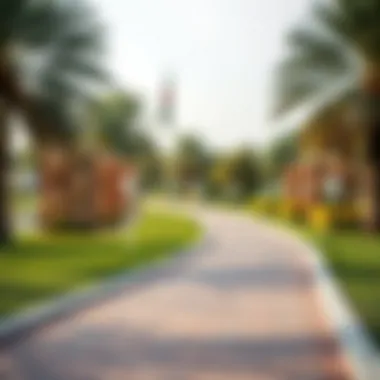
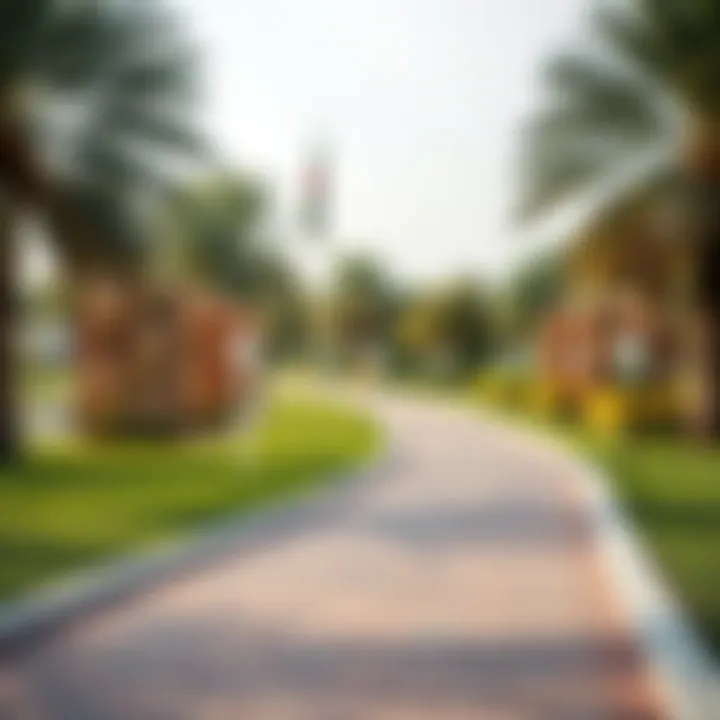
Al Barsha Pond Park is another significant green space, offering a serene retreat for the bustling life around it. The landscaped park features a large pond surrounded by walking and jogging paths, making it a favored spot for fitness enthusiasts and families. The tranquil atmosphere is punctuated with activities, such as picnicking, cycling, and children's play areas, appealing to a wide audience.
With a focus on community well-being, Al Barsha Pond Park also encourages ecological engagement, as it hosts workshops and wellness events aimed at uplifting the community’s connection to the environment. For real estate analysts, spaces such as this park are crucial metrics of location desirability, influencing property value and investment opportunities.
In summary, public gardens like Zabeel Park, Dubai Miracle Garden, and Al Barsha Pond Park contribute significantly to the urban landscape of Dubai, helping community members reconnect with nature, while also serving as valuable assets for the real estate market. Understanding their role is essential for anyone looking to navigate the dynamic interplay of living, investing, or simply enjoying the beauty of Dubai.
Private Gardens: Luxury and Personalization
When you think of Dubai, the mind likely dances with images of skyscrapers, bustling bazaars, and shimmering beaches. Yet, tucked away behind opulent villas and estates lies a world of lush private gardens. These oasis-like spaces blur the lines between indoor luxury and the outdoors, offering a sanctuary from the city’s raucous pace. Their value extends beyond mere aesthetics; they serve as personal retreats, reflecting individuality and creativity, while also enhancing property allure.
A well-designed private garden is more than just an arrangement of plants. It’s a canvas for homeowners to express their tastes, preferences, and lifestyles. Whether it’s a minimalist Zen garden or a vibrant Mediterranean-style layout, each space tells a unique story. This personalization allows owners to customize their landscapes, making thoughtful choices about flora, layout, and features that resonate with their vision of home.
Contemporary Design Trends
In recent years, contemporary design trends have led many homeowners to create innovative outdoor spaces that harmonize with their architectural style. These gardens often employ clean lines and open spaces while integrating natural elements effectively. To get a taste of what’s currently hot in garden design, consider the following trends:
- Sustainable Practices: Homeowners are incorporating eco-friendly designs that minimize water usage while maximizing aesthetic appeal. For instance, installing drip irrigation systems and using drought-resistant plants are common practices.
- Outdoor Living Rooms: Many gardens are designed as extensions of the home, featuring sofas, fire pits, and cooking areas that make them suitable for entertaining or intimate family gatherings.
- Zen Spaces: Inspired by Japanese gardening principles, these tranquil areas emphasize balance, serenity, and simplicity. People are increasingly turning to rock gardens, koi ponds, and bamboo features to create these peaceful retreats.
Each of these trends emphasizes functionality while retaining beauty, making private gardens the perfect blend of luxury and practicality.
Smart Gardening Solutions
With the rise of technology, smart gardening is becoming a game-changer in maintaining these opulent outdoor spaces. Garden enthusiasts and owners can now monitor their gardens remotely and optimize their care through various solutions. Some noteworthy aspects include:
- Automated Irrigation Systems: These systems utilize soil moisture sensors to ensure plants receive the right amount of water at the right time, preventing both overwatering and drought stress.
- Smart Lighting: Timed lighting systems enhance aesthetics and allow for night-time enjoyment, illuminating pathways, or highlighting plant features without much hassle.
- Garden Management Apps: Using mobile applications, homeowners can track their plant care schedules, identify potential issues, and seek expert advice, ensuring their green space remains vibrant and healthy all year long.
As these technologies advance, they will further empower garden owners to cultivate captivating environments, marrying luxury with innovation.
"Gardens are the ultimate symbol of luxury. They bring not only beauty but also comfort and a sense of well-being in a fast-paced world."
Territory by territory, as sustainability, technology, and personal expression become integrated in private gardens, Dubai’s luxurious green spaces will continue to evolve, mirroring the aspirations of its affluent residents.
The Role of Climate in Garden Design
When it comes to gardening in Dubai, the climate plays a significant role in shaping the landscape. The unique weather conditions in the region not only influence what can be planted but also dictate how gardens are designed and maintained. In an area where temperatures can soar well above 40°C during the summer months, understanding climate specifics is key to cultivating a thriving green space.
Understanding Dubai's Climate
Dubai's climate is classified as arid, characterized by high temperatures and minimal rainfall. The summer years can roast the city, while winters bring cooler days. Rainfall averages around 3-5 cm annually, making it one of the driest areas. Still, the mild periods, particularly between November and March, offer a window for outdoor gardening activities.
- Searing summer heat: In June through August, the heat can cause major stress to plants, necessitating careful strategic planning for what varieties thrive in such high heat.
- Dry conditions: With little moisture from the sky, reliance on irrigation becomes critical. Knowing the right systems to employ, like drip irrigation, can make a significant difference in plant health.
- Wind patterns: The coastal breeze can also shift unexpectedly, impacting garden layout. Windbreaks might be necessary to protect delicate plants.
Those wanting to dive into gardening in Dubai must grasp these nuances to avoid the pitfalls of misguided planting.
Selecting Appropriate Flora
Choosing the right plants for Dubai's climate isn't just a good idea; it's a necessity. The wrong selection can spell disaster, turning lush aspirations into barren wastelands.
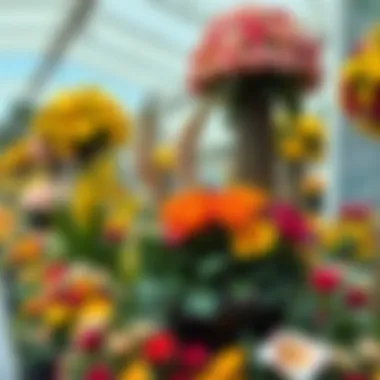
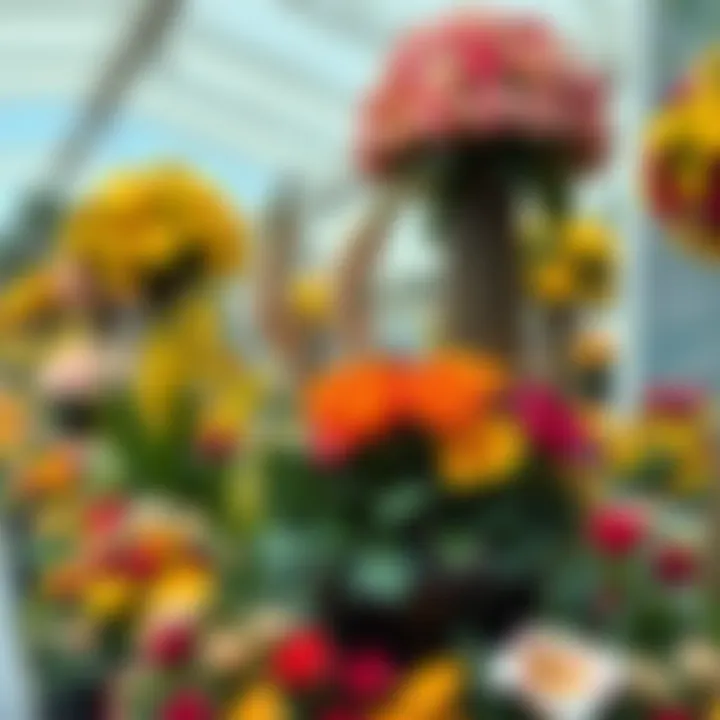
- Drought-resistant species: Look for plants that can endure the heat and little water. Agave, succulents, and many native species thrive excellently in such conditions.
- Native flora: Incorporating local plants like the Ghaf tree, which forms a natural part of the U.A.E’s ecosystem, can enhance the landscape while reducing water usage.
- Seasonal blooms: To enjoy color throughout the year, consider seasonal flowers that bloom during the cooler months, like Bougainvillea, which can add vibrant touches to landscapes very resiliently.
By choosing plants that are adaptable to the heat and can handle long dry spells, gardeners can create a sustainable and beautiful space. In a place like Dubai, the selection of flora is an art and a science, merging aesthetic desires with the practicality dictated by nature.
"In Dubai, the best gardens are not just about beauty; it's about smart choices that marry elegance with resilience."
The choices one makes in plant selection can determine the long-term success of any garden. Balancing beauty with functionality is the name of the game, ensuring that the oasis created harmonizes with Dubai's distinctive climate.
Sustainability Practices in Dubai Gardens
Gardens in Dubai are not just beautiful patches of greenery amidst the desert landscape; they reflect a shift towards sustainability in urban development. With a growing focus on environmental responsibility, the residents and authorities of this glitzy city are adopting eco-friendly practices to enhance the longevity and appeal of their gardens. Sustainability in gardening is crucial, offering a multitude of benefits that encompass ecological balance, resource conservation, and community well-being.
The significance of sustainable gardening practices cannot be overstated. They help to reduce the ecological footprint of urbanization, create resilient ecosystems, and enhance property values in the long run. Moreover, they promote biodiversity by creating habitats for various species and improve air quality, contributing to a healthier urban environment.
In the context of Dubai, where water is a precious resource and available in limited supply, addressing sustainability practices in gardening becomes even more pressing. Let's explore specific strategies that support water conservation and organic gardening initiatives, that together foster a sustainable gardening culture in this vibrant city.
Water Conservation Strategies
Water conservation in gardening, especially in a desert climate like Dubai's, is not just beneficial—it's essential. With temperatures often soaring above 40 degrees Celsius in the summer, effective water management practices must be at the forefront of gardening strategies.
- Drip Irrigation Systems: Implementing advanced drip irrigation systems enables gardeners to deliver water directly to the plant roots, minimizing evaporation and runoff. This technique uses significantly less water compared to traditional sprinklers.
- Mulching Techniques: Using organic mulch, such as shredded leaves or wood chips, around plants can help retain moisture in the soil and keep it cool. This simple strategy not only conserves water but also reduces weed growth.
- Drought-Resistant Plants: Choosing native and drought-tolerant plants, such as the Bougainvillea and Agave, can drastically cut down on water needs. These plants are specifically adapted to withstand arid conditions, requiring less water once established.
"Sustainable approaches create not just beautiful gardens, but resilient ones, capable of thriving under harsh conditions."
In addition to these strategies, utilizing rainwater harvesting systems can be a game-changer in maximising water resources while keeping the garden lush and healthy. By installing rain barrels or tanks to collect and store rainwater, residents can water their gardens efficiently—even during the infrequent rain events Dubai experiences.
Organic Gardening Initiatives
Organic gardening represents not just a trend, but a commitment to environmental health. In Dubai, more individuals and community gardens are opting to use organic methods that avoid synthetic pesticides and fertilizers.
- Soil Health Improvement: By incorporating organic compost into the soil, gardeners can enhance soil fertility and structure. This amendment supports healthy plant growth and decreases reliance on chemicals.
- Pest Management: Utilizing natural pest control methods, like companion planting—growing plants that naturally repel pests—keeps gardens thriving. For instance, planting marigolds alongside vegetables can deter harmful insects.
- Community Workshops: Many local organizations offer workshops focused on organic gardening techniques. These gatherings provide resources and education, helping to foster a community that emphasizes sustainable practices.
Organic initiatives not only reduce the chemical load on the environment but also enhance the flavor and nutritional value of the produce grown in these gardens.
In summary, sustainability practices in Dubai's gardens combine innovative water conservation strategies with organic gardening initiatives. Both elements play a critical role in creating not only appealing green spaces but also resilient ecosystems that can withstand the challenges of an urban desert environment. As the city continues to grow, these practices will likely become even more essential to maintain the balance between nature and development.
Gardens as Real Estate Enhancers
The presence of gardens in residential properties within Dubai has become nothing less than a game changer in the real estate landscape. In a city where the skyline is dotted with skyscrapers and urban sprawl seems limitless, gardens provide a welcome touch of nature, enhancing not just the aesthetic appeal but also the overall value of properties. Homebuyers today are looking beyond mere bricks and mortar; they want environments that promote well-being and relaxation. Gardens accomplish this aim fabulously, becoming important assets in residential settings.
Impact on Property Value
When it comes to property value, the saying that "money grows on trees" might just hold some truth in Dubai’s real estate market. Various studies and reports suggest that homes with landscaped gardens tend to fetch higher prices compared to their non-landscaped counterparts.
- Boosts Curb Appeal: First impressions are lasting. A beautifully manicured garden can set the tone for potential buyers as they pull up to a property. Colorful flowers, neatly trimmed hedges, and well-maintained lawns all contribute to the initial emotional connection buyers make with a home.
- Increases Usable Space: Gardens extend the living area of a property. Buyers often envision gatherings, barbecues, or a peaceful morning coffee in the refreshing open air. This added functionality can make a property far more desirable.
- Offers Long-term Value: Properties integrated with greenery often appreciate better over time. With Dubai's hot climate, well-displayed gardens can also help reduce cooling costs, making them not only a visual enhancement but a financially savvy addition.
A quote worth pondering:
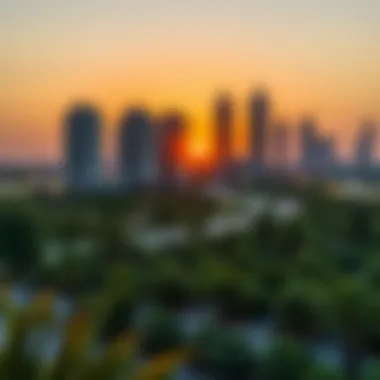

"A well-designed garden can add 10-15% to a property’s value, enhancing desirability and marketability over time."
Appealing to Buyers
In the cutthroat real estate market in Dubai, drawing in potential buyers is paramount, and distinctive gardens are crucial in this aspect. Buyers are increasingly crucial of their surroundings. A well-developed garden can tick off several boxes on their wish list.
- Cultivating Relaxation: In a bustling metropolis, an inviting garden can serve as an oasis where one can escape the frenetic pace of city life. Homes that offer tranquility through outdoor spaces tend to be more appealing.
- Tailored Aesthetics: Having a custom-designed garden allows owners to express their individuality. Prospective buyers often see a well thought-out garden as an extension of personal style, which can be a powerful motivator in the decision-making process.
- Sustainable Practices: Many buyers today are eco-conscious and look for homes that reflect their values. Gardens that utilize sustainable practices further enhance a property's allure. Features such as xeriscaping, native plants, or sustainable irrigation systems resonate with buyers looking to minimize their environmental impact.
Ultimately, homes in Dubai with lush, thoughtfully designed gardens do more than just enhance their marketability; they craft a narrative of comfort, luxury, and an enviable lifestyle that resonates profoundly with discerning buyers.
Future Trends in Dubai's Gardening Landscape
The evolution of gardening in Dubai reflects a desire not just for beauty but for environmental consciousness and community cohesion. Gardening in a city renowned for its dynamic skyline and luxury living is entering a new phase, one that embraces sustainability and innovation. This section explores two key trends: vertical gardens and community gardening projects, both of which are reshaping the landscape of urban greenery.
Vertical Gardens
Vertical gardens have burst onto the scene in Dubai like a breath of fresh air. These innovative structures allow greenery to flourish in a space-saving manner, perfect for a city where every square metre counts. Vertical gardens transform bland walls into vibrant showcases of flora, presenting not just an aesthetic enhancement but also numerous benefits.
- Space Efficiency: In urban environments where horizontal space is limited, vertical gardens climb to the challenge. They utilize walls and fences, allowing for lush displays without covering valuable ground.
- Air Quality Improvement: A well-planted vertical garden can improve air quality significantly, absorbing pollutants and increasing oxygen levels. This is especially pertinent in a bustling metropolis like Dubai.
- Thermal Regulation: These gardens can also help insulate buildings, reducing energy consumption and enhancing climate control, thus making them more inviting.
Moreover, the appeal of vertical gardens extends beyond functionality. They encourage creativity in design; from succulents to flowering vines, the choices are endless. In Dubai, where aesthetics often take centre stage, these lush walls create unique spaces that captivate residents and visitors alike.
Community Gardening Projects
Community gardening projects are sprouting up like daisies amidst the desert. Initiatives in Dubai are inspiring residents to dig their hands into the soil, fostering a deeper connection to both the land and their neighbours. These gardens aren’t just patches of green; they serve multiple purposes that benefit urban communities.
- Social Cohesion: They provide a platform for people to come together, breaking down barriers and building relationships among diverse communities. Gardening encourages collaboration, as individuals work together towards a common goal.
- Education on Sustainability: Such projects often include workshops and educational programs that promote eco-friendly practices, empowering residents with the knowledge to maintain their gardens sustainably. This is particularly vital in a city striving to enhance its green credentials.
- Local Food Production: With the global supply chain often fraught with uncertainties, community gardens support local food production, encouraging urban residents to grow their own fruits and vegetables. This helps to enhance food security in an area known for its reliance on imports.
"Community gardens not only beautify our urban landscape, they deepen our ties with one another and the environment."
The End: The Evolution of Green Spaces in Dubai
As Dubai continues to grow, the evolution of its green spaces takes on added significance. Urban development often comes at the expense of nature. However, the transformation we observe in Dubai serves as a prime example of how cities can integrate lush environments amidst rapid modernization. This guide has explored the plethora of gardens and parks that are not only aesthetic assets but contribute substantially to the ecological footprint of the city. We see evidence that demonstrates gardens are not merely for pleasure; they represent a critical strategy for urban sustainability and community cohesion.
Long-term Vision for Sustainable Gardens
The future of gardening in Dubai hinges on a long-term vision focused on sustainability. As the desert city grapples with issues stemming from climate change and water scarcity, the significance of developing environments that can thrive in such conditions becomes increasingly apparent. The goal is to create gardens that not only survive but flourish with minimal environmental impact.
- Native Plant Usage: Leveraging native flora that require less water is crucial. This promotes biodiversity that is attuned to the local climate.
- Smart Watering Techniques: Employing techniques such as drip irrigation ensures that every drop counts, minimizing waste, and supporting efficient gardening practices.
- Community Engagement: Encouraging local residents to participate in gardening initiatives fosters a sense of stewardship toward the environment.
Such practices ensure that green spaces effectively contribute to the urban fabric, providing ecological balance while enhancing the quality of life for residents.
Final Thoughts on Gardening in a Desert City
Gardening in a harsh climate like Dubai's is no small feat, yet it is a challenge that has inspired creativity and innovation. It’s a journey where dreams of greenery meet the realities of sand and sun.
Furthermore, the benefits of these green havens extend beyond aesthetics. They serve as social hubs, offering residents a place to gather and enjoy nature, away from the hustle and bustle of the city. These spaces foster community ties and enable a lifestyle that embraces wellness in an urban setting.
Gardening in Dubai is not just about creating pretty landscapes; it’s about establishing a relationship with the environment that encourages sustainability. It’s a testament to resilience and a glimpse into future developments that recognize the importance of harmonizing urban living with the natural world.
"Green spaces in the desert are not a frivolous luxury but rather an investment in sustainable living and community health."
As Dubai continues to evolve, its gardens are likely to become more intricate, diverse, and vital to the city's identity. In this journey, it’s critical for investors, homeowners, and developers alike to recognize the immense potential green spaces hold in framing the city's landscape and lifestyle.







